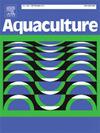二十二碳六烯酸可减轻杂交石斑鱼(Epinephelus fuscoguttatus ♀ × E. lanceolatus ♂)胆固醇累积引起的肝脏脂质沉积和健康损害
IF 3.9
1区 农林科学
Q1 FISHERIES
引用次数: 0
摘要
胆固醇积累可能是一种重要的病理标志,虽然二十二碳六烯酸(DHA)降低胆固醇的潜力已在哺乳动物中得到广泛记录,但其在鱼类中的效果尚不清楚。本研究调查了胆固醇积累对肝脏健康的不利影响,并评估了 DHA 作为一种潜在的胆固醇降低剂,可减轻杂交石斑鱼(Epinephelus fuscoguttatus ♀ × E. lanceolatus ♂)因摄入高胆固醇(HC)而引起的肝损伤。给石斑鱼喂食对照组日粮或添加不同水平 DHA(0、0.5、1、2%)的 HC(1.6%)日粮,为期八周。HC日粮明显增加了条件因子(CF)、肠系膜脂肪指数(MFI)以及肝脏中脂质、胆固醇和甘油三酯的积累。在 HC 日粮中添加 0.5 % 的 DHA 可明显降低 CF、MFI 和肝脏脂质含量。此外,摄入碳氢化合物会增加血清中天冬氨酸转氨酶(AST)和丙氨酸转氨酶(ALT)的活性、丙二醛(MDA)含量以及肝脏中与炎症反应和细胞凋亡相关的基因表达。此外,摄入碳氢化合物会明显降低肝脏中线粒体的生物生成和总抗氧化能力。然而,通过抑制胆固醇合成和促进胆固醇外流,补充 0.5 % DHA 的 HC 膳食可明显减少肝脏胆固醇积累,并通过抑制脂肪生成和脂滴形成相关基因的表达,明显降低肝脏甘油三酯含量。此外,在高密度脂蛋白膳食中补充 0.5 % 的 DHA 可显著降低血清中谷氨酸氨基转移酶和谷草转氨酶的活性、MDA 含量以及肝脏中炎症、凋亡和抗氧化相关基因的表达,并增强肝脏线粒体的生物生成。总之,研究结果表明,补充 DHA 可通过抑制胆固醇合成和促进胆固醇外流来缓解肝脏胆固醇积累,并可增强线粒体功能,提高抗氧化能力,减轻肝脏炎症反应,最终减轻胆固醇积累对肝脏的损伤。本研究阐明了胆固醇积累对水生动物肝脏健康的不利影响,并提出了将 DHA 作为一种潜在的干预措施,以减轻胆固醇超载带来的健康问题。本文章由计算机程序翻译,如有差异,请以英文原文为准。
Docosahexaenoic acid alleviated liver lipid deposition and health damage induced by cholesterol accumulation in hybrid grouper (Epinephelus fuscoguttatus ♀ × E. lanceolatus ♂)
Cholesterol accumulation can be a critical pathological marker and, while, the cholesterol-lowering potential of docosahexaenoic acid (DHA) has been documented extensively in mammals, its effects in fish are unclear. The present study investigated the adverse effects of cholesterol accumulation on liver health, and evaluated DHA as a potential cholesterol-lowering agent to mitigate liver damage induced by high cholesterol (HC) intake in hybrid grouper (Epinephelus fuscoguttatus ♀ × E. lanceolatus ♂). Grouper were fed either a control diet or an HC (1.6 %) diet supplemented with varying levels of DHA (0, 0.5, 1, 2 %) for eight weeks. The HC diet significantly increased condition factor (CF), mesenteric fat index (MFI), and lipid, cholesterol and triglyceride accumulation in liver. Supplementing the HC diet with 0.5 % DHA significantly reduced CF, MFI and liver lipid contents. Moreover, HC intake increased aspartate transaminase (AST) and alanine transaminase (ALT) activities in serum, and malondialdehyde (MDA) content and the expression of gene related to inflammatory responses and apoptosis in liver. In addition, HC intake significantly reduced mitochondrial biogenesis and total antioxidant capacity in liver. However, supplementing the HC diet with 0.5 % DHA significantly decreased liver cholesterol accumulation by inhibiting cholesterol synthesis and promoting cholesterol efflux, and significantly reduced liver triglyceride content by inhibiting the expression of genes associated with lipogenesis and lipid droplet formation. Furthermore, supplementation of the HC diet with 0.5 % DHA significantly reduced the activities of ALT and AST in serum, and MDA content and the expression of genes associated with inflammation, apoptosis and antioxidation in liver, and enhanced liver mitochondrial biogenesis. Overall, the results indicated that DHA supplementation mitigated liver cholesterol accumulation by inhibiting cholesterol synthesis and promoting cholesterol efflux, and enhanced mitochondrial function, boosted antioxidant capacity, and reduced inflammation in liver of grouper fed the HC diet, ultimately alleviating liver damage caused by cholesterol accumulation. The present study elucidated the detrimental effects of cholesterol accumulation on liver health in aquatic animals and proposed DHA as a potential intervention for mitigating health issues associated with cholesterol overload.
求助全文
通过发布文献求助,成功后即可免费获取论文全文。
去求助
来源期刊

Aquaculture
农林科学-海洋与淡水生物学
CiteScore
8.60
自引率
17.80%
发文量
1246
审稿时长
56 days
期刊介绍:
Aquaculture is an international journal for the exploration, improvement and management of all freshwater and marine food resources. It publishes novel and innovative research of world-wide interest on farming of aquatic organisms, which includes finfish, mollusks, crustaceans and aquatic plants for human consumption. Research on ornamentals is not a focus of the Journal. Aquaculture only publishes papers with a clear relevance to improving aquaculture practices or a potential application.
 求助内容:
求助内容: 应助结果提醒方式:
应助结果提醒方式:


